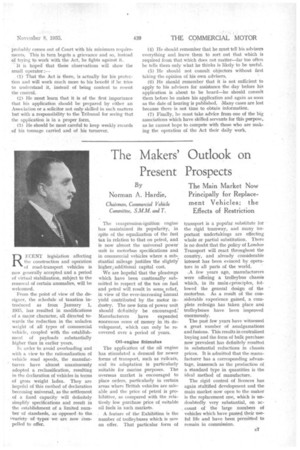The Makers' Outlook on Present Prospects
Page 129

If you've noticed an error in this article please click here to report it so we can fix it.
The Main Market Now Principally for Replacement Vehicles; the Effects of Restriction By Norman A. Hardie,
Chairman, Commercial Vehicle Committee, S.M.M. and T.
RECENT legislation affecting the construction and operation of road-transport vehicles is now generally accepted and a period of virtual stabilization, subject to the removal of certain anomalies, will be welcomed.
From the point of view of the designer, the schedule of taxation introduced as from January 1, 1935, has resulted in modifications of a major character, all directed towards the reduction in the unladen weight of all types of commercial vehicle, coupled with the establishment of payloads substantially higher than in earlier years.
In order to avoid overloading and with a view to the rationalization of vehicle road speeds, the manufacturers have almost unanimously adopted a reclassification, resulting in the declaration of vehicles in terms of gross weight laden. They are hopeful of this method of declaration becoming universal, as the settlement of a fixed capacity will definitely simplify specifications and result in the establishment of a limited number of standards,. as opposed . to the nvaziety of types we are now Compelled to offer. The compression-ignition engine has maintained its popularity, in spite of the equalization of the fuel tax in relation to that on petrol, and is now almost the universal power unit in motorbus specifications and in commercial vehicles where a substantial mileage justifies the slightly higher) additional capital cost.
We are hopeful that the pleadings which have been continually submitted in respect of the tax on fuel and petrol will result in some4relief, in view of the ever-increasing annual yield contributed by the motor industy. The new form of power unit should definitely be encouraged: Manufacturers have expended enormous sums of money in its development, which can only be recovered over a period of years.
Oil-engine Stimulus The application of the oil engine has stimulated a demand for newer forms of transport, such as railcars, and its adaptation is particularly suitable for marine purposes. The overseas market is encouraged to place orders, particularly in certain areas where British vehicles are saleable and the price of petrol is prohibitive, as compared with the relatively low purchase price of suitable oil fuels in such markets, A feature of the Exhibition is the number of trolleybuses which is now on offer. That particular form of transport is a popular substitute for the rigid tramway, and many important undertakings are effecting whole or partial substitution. There is no doubt that the policy of London Transport will react throughout the country, and already considerable inteiest has been evinced by operators in all parts of the world.
.A few years ago, manufacturers were offering a trolleybus chassis which, in its main/principles, followed the general design of the motorbus. As a result of the considerable experience gained, a complete redesign has taken place and trolleybilses have been improved enormously.
The past few years have witnessed a great number of amalgamations and fusions. This results in centralized buying and the form of bulk purchase now prevalent has definitely resulted in substantial reductions in chassis prices. It is admitted that the manufacturer has a corresponding advantage, inasmuch as the production of a standard type in quantities is the ideal method of manufacture.
The rigid control of licences has again stultified development and the main market now open to the maker is the replacement one, which is undoubtedly very substantial, on account of the large numbers of vehicles which have pasth,ed, their useful life and have been permitted to remain in commission.












































































































































































































































































































